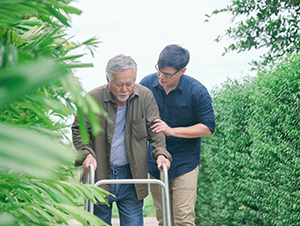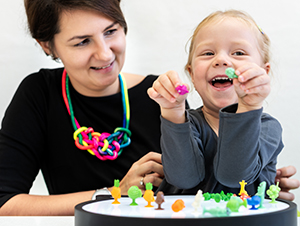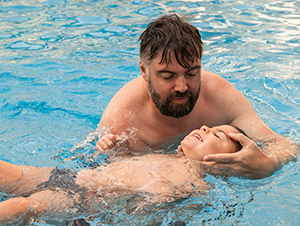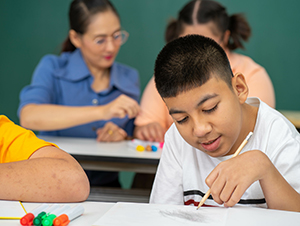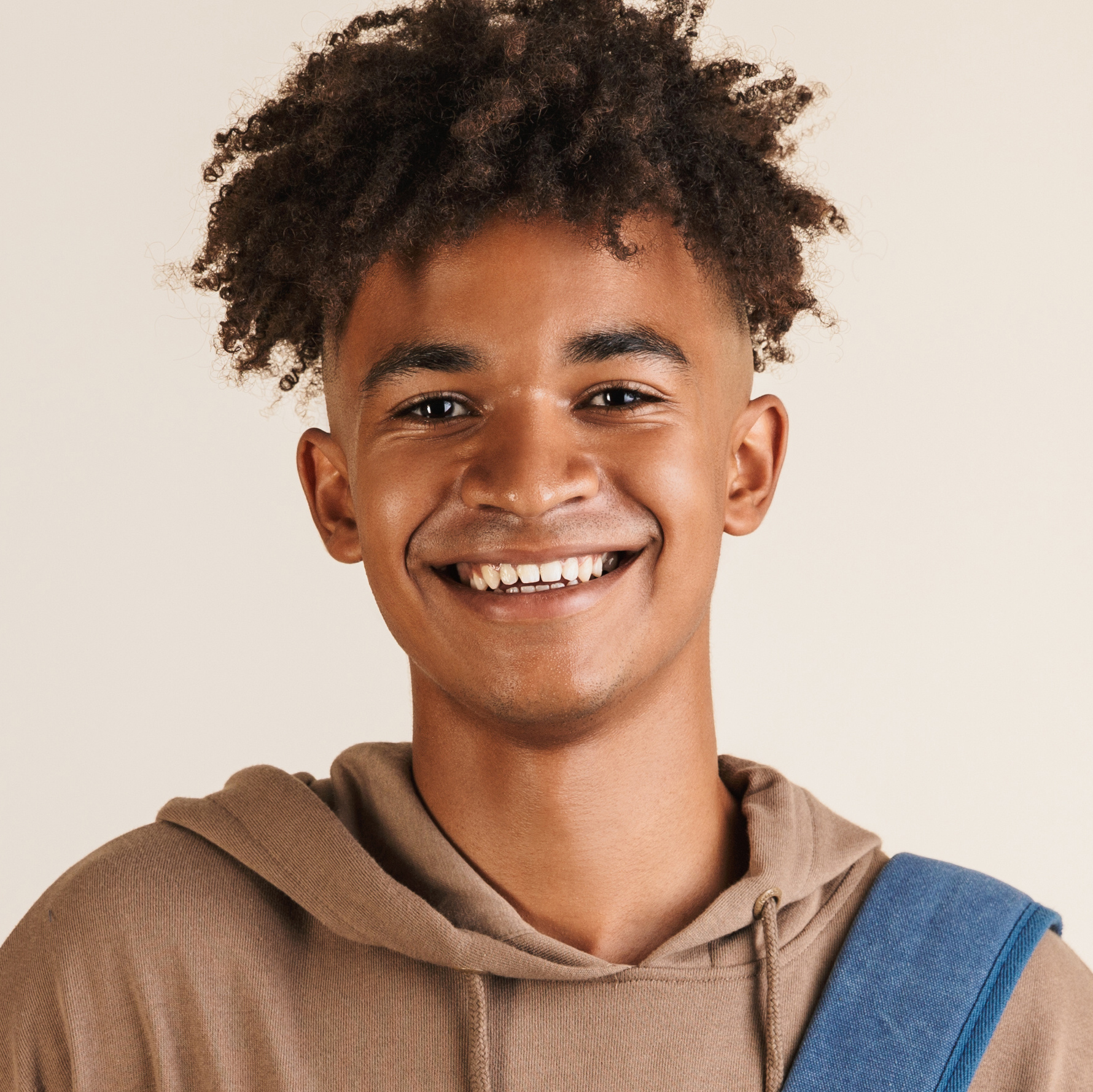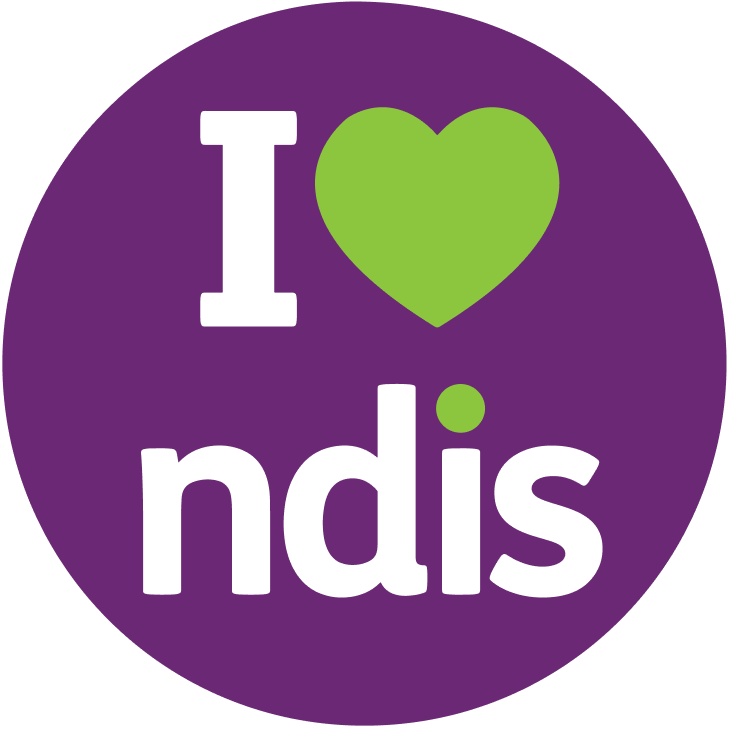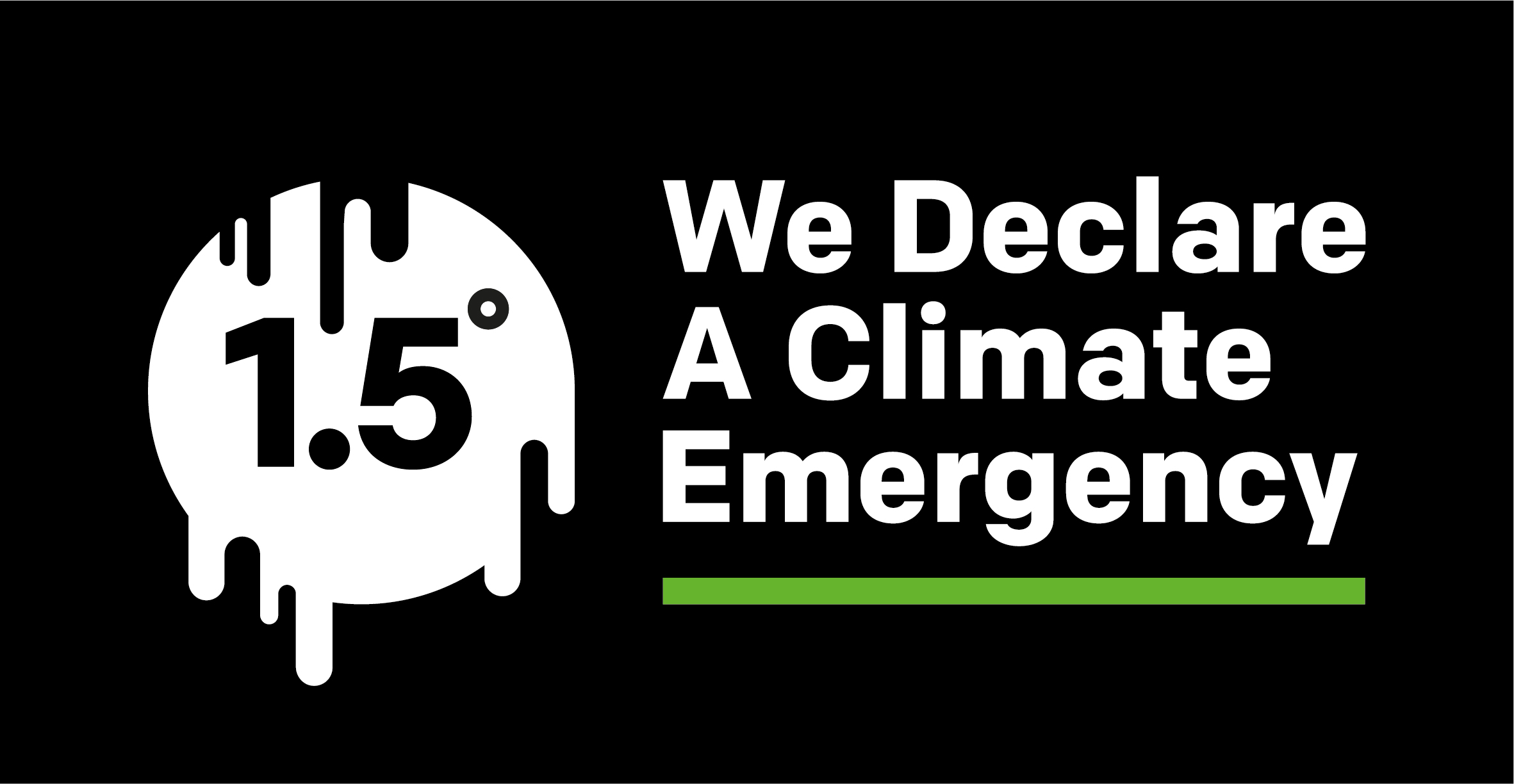Allied Health Assistant Jobs with Fora
Learn more and apply today.
Working as an Allied Health Assistant (also known as a Therapy Assistant) is a flexible and rewarding way to gain practical therapy experience. Specifically, you’ll collaborate with your client’s Allied Health Professional to assist them in practising therapy between sessions, thereby helping them reach their therapy goals. Moreover, we are hiring now in Melbourne, Sydney, Brisbane, Perth, and Adelaide.
Working with an Allied Health Assistant helps Liam reach his therapy goals faster.
Liam, a young boy on the Autism spectrum, works with his Speech Pathologist, Laura, on his therapy goals. Between sessions with Laura, Liam practices implementing therapy at home with Mia, an Allied Health Assistant.
Mia, for instance, lives nearby and is currently in her third year of Speech Pathology at university. She regularly checks in with Laura to report back on Liam’s progress and to receive feedback on how she can best support Liam’s therapy journey. Notably, Mia’s support is supplementary to, rather than a replacement for, Laura’s ongoing Speech Pathology sessions.
By working with both Laura and Mia, Liam is able to access more hours of therapy without increasing his budget, thus enabling him to reach his goals faster!
Allied health assistant jobs
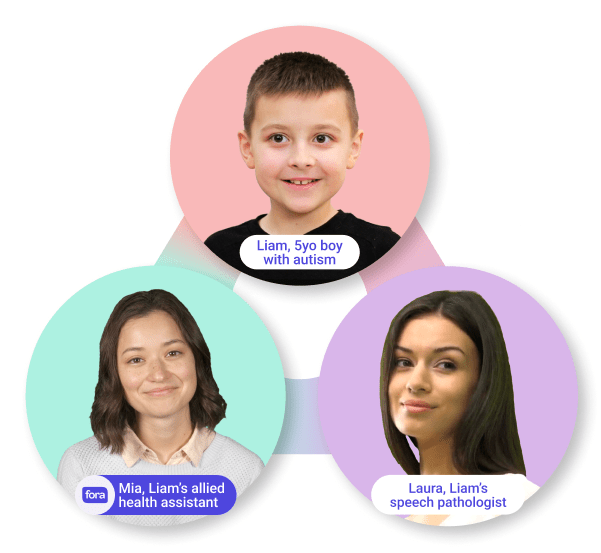
Our AHAs love working with Fora!
What can an Allied Health Assistant do?
Am I eligible?
In general, we accept applicants from the following backgrounds:
How do I begin?

Step 1: Create an account and get verified
To apply for a job as an allied health assistant begin by creating an account and answering some simple questions about who you are. Get verified by uploading your:
- NDIS Worker Screening Check
- Working with Children Check
- NDIS orientation module
- Professional referee details
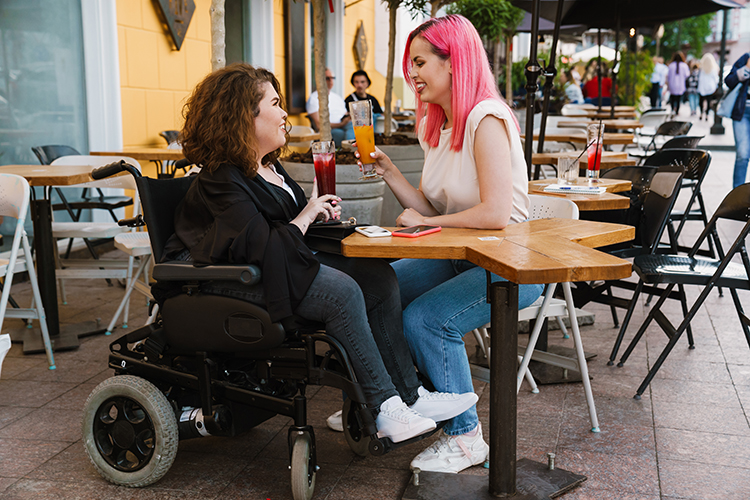


Step 4: Regular sessions and check-ins
Carry out the tasks delegated to you by your client's allied health professional.
Keep the AHP in the loop via email, and regularly attend their regular sessions with the client. If this is not possible, you can check in using email, video or phone calls. The AHP will decide how frequently check-ins occur based on the needs of the client.
Frequently asked questions
An allied health assistant can:
- Implement an allied health professional’s (AHPs) therapy strategies and programs in the client’s home or community. This includes instructing, encouraging, and assisting clients in performing therapy-related activities, as well as other daily living activities.
- Interview a client at the Meet & Greet, receive and understand information about a client’s condition and healthcare history at the initial handover with the client’s AHP.
- Help clients in using assistive technology or supportive devices if required.
- Document sessions, progress and collect data via online timesheet and note-taking tool.
- Relay the information provided by the client’s allied health professional to the clients and their carers; i.e. therapeutic regimens, general information, and promoting wellness and health maintenance.
- Attend and observe a session between the client and the client’s allied health professional with permission from the client/client’s parent or guardian and AHP.
- Maintain and monitor goal objectives as specified by the client’s allied health professional.
- Contribute to an allied health professional’s effectiveness by identifying client care issues.
- Maintain regular communication with the client’s allied health professional.
By creating a Fora worker profile you’re letting us know you’d like to work casually as an Allied Health Assistant (AHA).
An allied health assistant’s role is to help a client build their capacity and increase their independence. You would do this by:
- Helping clients to implement the therapy plan and strategies created by a qualified therapist or allied health professional (AHP).
- Seeing clients between their appointments with their AHPs.
- Helping clients practise and reinforce what they’ve learned with their allied health professionals.
It is crucial to recognise that an allied health assistant does not replace an allied health professional.
An allied health assistant MUST NOT:
- Make an assessment, diagnosis or treatment plan for a client.
- Modify a treatment plan in a way that has not been recommended by a therapist.
- Verbally or in-writing make recommendations or suggestions about the treatment plan.
- If therapy assistants are ever asked to write a report for the client, it must be strictly from a reflective and objective perspective.
- I.e. therapy assistants can only make comments about their experiences and progress witnessed in the time working with the client. They must not include their opinions about what they think has or hasn’t been working, or what should be done next.
- Share personal information about a client to any person outside the client’s therapy team.
- All client information must be kept strictly confidential. This means de-identifying any information (not naming clients, their suburb, their place of work or school, their disability) when discussing work outside of Fora or with the client’s healthcare team. This includes any private discussion with friends or family or public discussions like in a hospital or university class.
Our allied health assistants handle caseloads of a variety of ages (from infants to the elderly) and conditions (physical and intellectual disabilities):
- Paediatric clients have conditions that include ASD, ADHD, speech delays, global developmental delay, cerebral palsy, global coordination disorder, down syndrome, intellectual disability.
- While adult clients present conditions such as post-stroke, multiple sclerosis, acquired brain injury, geriatrics, multiple sclerosis, muscular dystrophy, Parkinson’s disease and others.
- Physiotherapy allied health assistants often work with
- children living with cerebral palsy, muscular dystrophies, developmental delay, and
- adults who have had strokes or acquired brain injuries.
- They handle muscular and neurological-based caseloads with a mix of tasks including rehabilitation, mobilisation, pain management, and preventative techniques.
Occupational therapy allied health assistants:
- Work with clients of all ages.
- Tasks may include helping children with emotional regulation, routine management, practising fine and gross motor tasks, or assisting with hydrotherapy.
- Help young adults with community engagement, public transport training and developing independence with ADLs. OT allied health assistants often work with children living with autism spectrum disorder, ADHD, sensory processing disorder, and other intellectual disabilities.
Speech Pathology allied health assistants:
- Work with clients of all ages.
- Tasks include helping non-verbal individuals use augmentative and alternative communication devices, supporting individuals with social skills, and helping children reach developmental milestones.
- Speech Therapy allied health assistants often work with children with autism spectrum disorder, developmental delay and other speech disorders.
You have no strict requirements regarding support work and personal care. You will be provided with information about a client’s needs before you apply to work with them.
An allied health assistant’s primary role is to help build a client’s capacity. This said, sometimes your role and responsibilities won’t appear ‘therapeutic’, e.g helping a client with an intellectual disability to get ready for school. However, it is important to remember that there are strategies you can use to help organise their thoughts and executive planning to increase your client’s independence.
When supporting a client in everyday tasks, remember to keep a client’s goals in mind and implement therapy strategies where appropriate. You can ask the client’s allied health professional to provide guidance on how to do this.
It’s a good idea to chat about any non-therapeutic work that the client may need help with while you’re working with them during your meet and greet. Depending on what your clients need are and how comfortable you feel with the type of additional activities they are requesting, you can decide how you would like to proceed.
You can
- let them know you’d like to work with them but would prefer not to assist with anything that is non-therapeutic,
- let them know you’d like to work with them but ask them to modify the activities to a level you feel comfortable helping with, or
- choose not to proceed.
The main thing to keep in mind is that it’s always better to be open and honest from the get-go.
For clients, families, allied health professionals, and Fora to feel comfortable that you have the skills to be an allied health assistant, ideal candidates have the following experience and skills:
- Work or volunteer experience working with children and adults with disabilities or mental health disorders
- Completion of university or TAFE placements working with children or adults
- Professional (paid work or volunteer) experience and/or personal experience with people with disabilities is also highly regarded (for example, support work, tutoring, babysitting, sports or swim coaching, special-school aiding or volunteering at disability organisations).
If you are in the earlier stages of your degree and do not have a lot of experience, you can still become an allied health assistant. In this case, we recommend you apply only to work with clients with low needs.
When working with a client with low needs, your role might be similar to that of a support worker. A support worker is somebody that helps an individual in their activities of daily life. These roles may require no input from allied health professionals and might be unrelated to your therapy domain.
They may involve tasks like:
- Supporting somebody to attend social and community activities
- Assisting with everyday activities such as grocery shopping, cooking a meal, completing homework or getting ready for school
- Pick-up and drop-offs to school or therapy sessions, as some people do not have the capacity to independently take public transport
These roles are a great way to develop your experience in working with people with disabilities and may allow you to step into more therapy-based roles later in your studies.
To be eligible to apply, you must have at least ONE of the following:
- Be currently enrolled in or have graduated from the following accredited Australian university degrees:
- Occupational Therapy
- Physiotherapy
- Speech Pathology
- Completion of a Physiotherapy, Occupational Therapy or Speech Pathology degree at an international university
- Completion of a Certificate IV in Allied Health Assistance
- Both Fora and the allied health assistant will fill out a worker injury claim form
- We will send the form to our insurance company
- The insurance company will investigate
- The insurance company decides next steps and informs parties involved
- Fora assumes all responsibility for the actions of our allied health assistants and provides all the necessary insurances, i.e. Professional Indemnity, Public Liability and WorkCover Insurance.
- A client’s AHP is not liable for the actions of Fora’s allied health assistant.
- Allied health assistants do not fall under the professional indemnity insurance of client’s therapists, they are covered by Fora. This said, it is expected that tasks are delegated within the competency of the family or allied health assistant.
- This means we are responsible for everything an allied health assistant does as long as what you’ve delegated to them is within their competency
- i.e. if they are following your plan and make a mistake or go out of scope it’s under our liability
- if you delegate something that is not appropriate for the client or the allied health to do, and then it’s under your liability
- Fora will remove allied health assistants from any role/s where:
- there is an unsafe work environment
- they are not appropriately guided by an AHP”
For sessions less than 2 hours long the pay structure is as follows:
| Day | Minimum pay per session | Minimum pay per session incl. superannuation |
| Weekdays | $60.80 | $67.18 |
| Saturday | $77.40 | $85.52 |
| Sunday | $99.60 | $110.05 |
For 1.5 hour sessions, note-writing time will now be included in the 2-hour minimum pay.
For sessions lasting 2-hours or more the pay structure is as follows:
| Day | Pay per hour | Pay for note-writing | Minimum pay per session |
| Weekdays | $36.00 | $5.70 | $85.86 |
| Saturday | $49.00 | $5.70 | $114.59 |
| Sunday | $62.00 | $5.70 | $143.32 |
| Public Holidays | $65.00 | $5.70 | $149.95 |
Question not answered here? Check out our full knowledge base here
